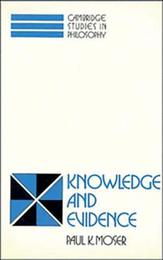
|
Knowledge and Evidence
Paperback / softback
Main Details
| Title |
Knowledge and Evidence
|
| Authors and Contributors |
By (author) Paul K. Moser
|
| Series | Cambridge Studies in Philosophy |
|---|
| Physical Properties |
| Format:Paperback / softback | | Pages:300 | | Dimensions(mm): Height 216,Width 140 |
|
| Category/Genre | Analytical philosophy and Logical Positivism |
|---|
| ISBN/Barcode |
9780521423632
|
| Classifications | Dewey:121 |
|---|
| Audience | | Tertiary Education (US: College) | | Professional & Vocational | |
|---|
| Illustrations |
Worked examples or Exercises
|
|
Publishing Details |
| Publisher |
Cambridge University Press
|
| Imprint |
Cambridge University Press
|
| Publication Date |
26 July 1991 |
| Publication Country |
United Kingdom
|
Description
Paul Moser's book defends what has been an unfashionable view in recent epistemology: the foundationalist account of knowledge and justification. Since the time of Plato philosophers have wondered what exactly knowledge is. This book develops a new account of perceptual knowledge which specifies the exact sense in which knowledge has foundations. The author argues that experiential foundations are indeed essential to perceptual knowledge, and he explains what knowledge requires beyond justified true beliefs. In challenging prominent sceptical claims that we have no justified beliefs about the external world, the book outlines a theory of rational belief.
Author Biography
Paul K. Moser is Professor and Chair of Philosophy at Loyola University Chicago. He is the author of The Elusive God (Cambridge University Press, 2008), editor of Jesus and Philosophy (Cambridge University Press, 2008), and co-editor of Divine Hiddenness (Cambridge University Press, 2002) and of The Rationality of Theism (Routledge, 2003). He is also editor of the journal American Philosophical Quarterly. He is currently writing a book titled The Evidence for God for a non-scholarly audience (to be published by Cambridge University Press).
Reviews'Moser has produced a foundationalist account of justification and knowledge ... that in some respects is superior to anything else in the literature.' W. Alston, Syracuse University 'Paul Moser's book is a powerful antidote to the naive but morally and intellectually damaging 'relativism', that pervades much contemporary social and literary theory, but it is much more than that. Unfashionably but persuasively, Moser defends a foundationalist epistemology and a verison of the correspondence theory of truth.' The Times Higher Education Supplement
|